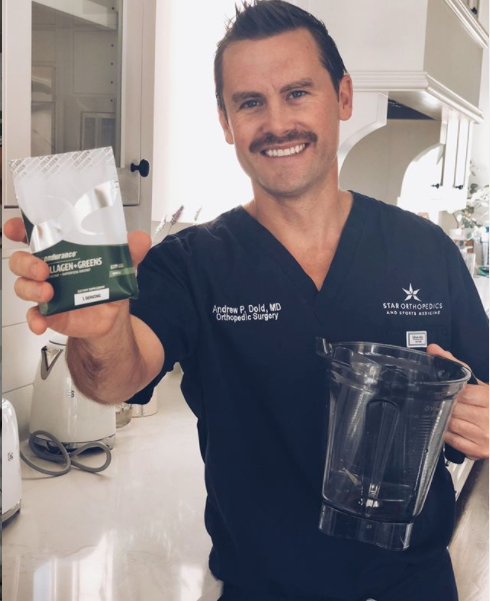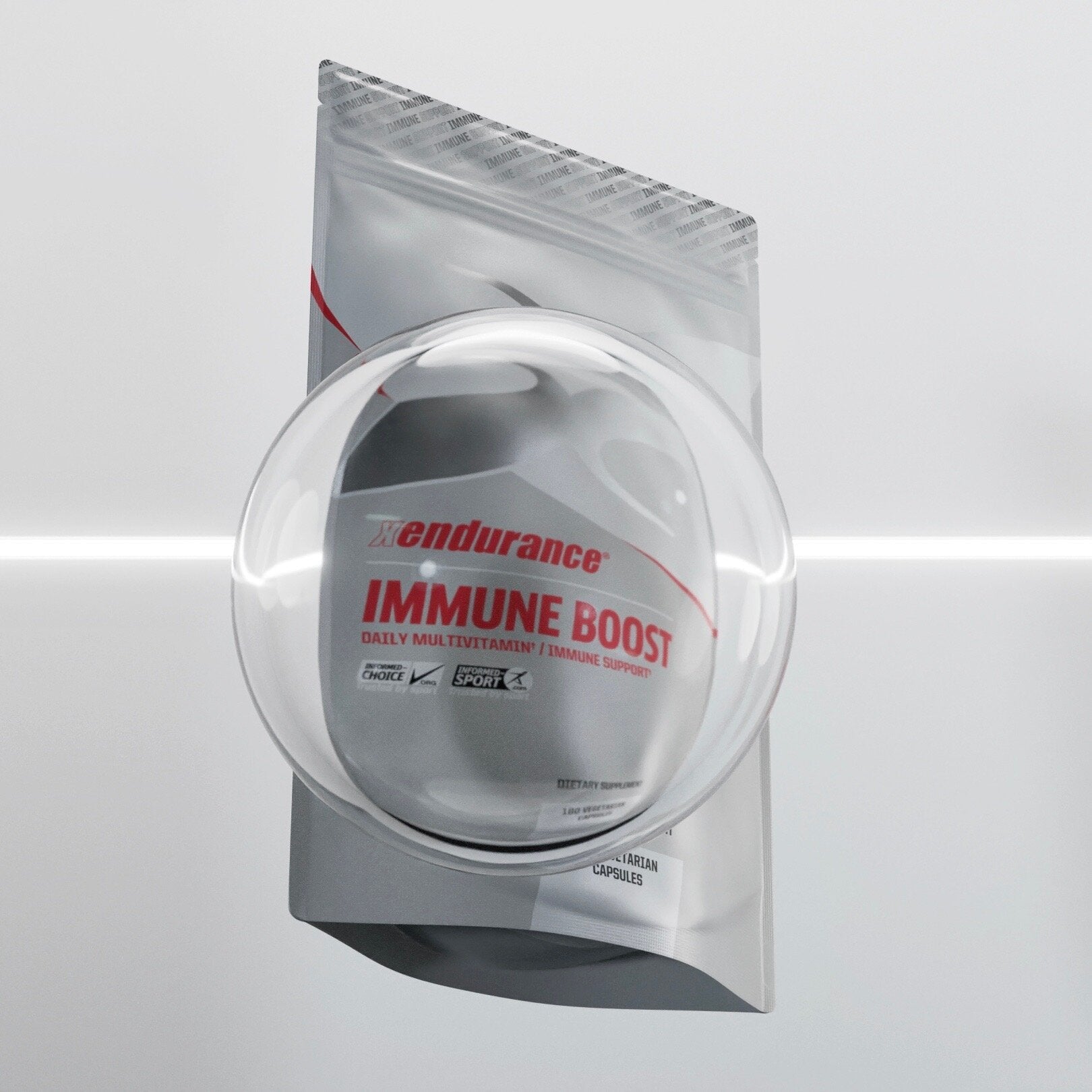Written by: Andrew Dold, MD Orthopedic Surgeon, Sports Medicine Specialist
@dr.dold.md
As an orthopedic surgeon and sports medicine specialist, I am always looking for ways to improve outcomes for my patients, both after surgery and in the conservative care and treatment of musculoskeletal injuries. Recently, over the past few years, collagen supplements have become popular products in the fitness, sports nutrition, and dermatology arenas, but their use and application in sports medicine and recovery has only just started. Collagen is the main structural protein of the body and the primary building block of the various products derived from the mesenchymal germ layer, including bone, tendon, ligament, muscle, and cartilage. Therefore, it’s no surprise that supplementing this product is of interest to sports medicine physicians like myself, whose primary role is to cure pathology and improve function of these same areas! In other words, help athletes heal and recover from injury as quickly as possible. If we could expedite healing times and potentially allow injured tissue to repair to a level even stronger than before the injury, why wouldn’t we? Furthermore, if consuming an oral supplement could potentially help prevent injury in the first place, wouldn’t this be the ideal strategy?
Collagen is a structural protein that forms connective tissue in the body. As the main component of connective tissue, it makes sense that it is actually the most abundant protein in our bodies. As with all types of protein, collagen is composed of a specialized sequence of amino acids, the building blocks of proteins. However, compared to most proteins in the body, collagen’s amino acid sequence and composition is unique, largely due to the high numbers of amino acids glycine, proline, hydroxyproline, and hydroxylysine within the collagen peptide. Importantly, the synthesis of the collagen peptide is dependent on a number of important enzymes, which require vitamin C (ascorbic acid) as a co-factor (read: Vitamin C is critically important to the synthesis of collagen, so don’t forget about it!). (*Historical note: Scurvy is a disease caused by a deficiency of vitamin C, characterized by swollen, bleeding gums and the opening of previously healed wounds, which classically affected poorly nourished sailors prior to the mid-nineteenth century. The sailors were unable to synthesize new collagen in their bodies due to vitamin C deficiency while at sea, resulting in poor immunity and a plethora of problems related to collagen deficiency. In 1757, Scottish surgeon James Lind conducted the first clinical trial, proving that lime juice prevented scurvy in the British navy (Limes are high in vitamin C). British sailors were subsequently encouraged to suck on limes during extended periods at sea, preventing the issues characteristic of scurvy. Hence, the British are sometimes referred to (in slang) as the “limeys” by their American counterparts). It makes sense to me that anyone trying to recover from an injury or musculoskeletal (orthopedic) surgery where collagen synthesis is important (bone fracture, cartilage injury, ligament tear, muscle tear, tendon rupture, etc.) should supplement both collagen peptides and vitamin C in order to promote healing, expedite recovery, and improve outcome…I put all of my post-operative patients on a 3-month course of high-dose vitamin C (1,000mg twice a day) and a daily collagen peptide (Xendurance Collagen + Greens).
Collagen peptides (also referred to as hydrolysed collagen) are contained in most over-the-counter collagen supplements. Think of these peptides as smaller pieces of the overall collagen protein. In other words, the larger, complex collagen protein has been disassembled and broken down into a number of smaller pieces, called “peptides.” These peptides are simply pieces of the overall collagen protein, with the exact same amino acid sequences. Due to their smaller size, the peptides are more easily absorbed from our gut into our bloodstream. In order to improve collagen production, these amino acids must be absorbed and transported to their target organs to act as the building blocks for new collagen synthesis. Randomized controlled trials and other studies are beginning to focus on the effects of collagen peptide supplementation.
Collagen is critically important to the structure and function of our skin. In fact, this protein accounts for 80% of our skin. A number of dermatology studies have shown a positive effect of oral collagen supplementation on the skin. One study (Inoue et al. 2016) showed an improvement in facial skin conditions, including facial skin moisture, elasticity, wrinkles and roughness after supplementing oral collagen peptides for a period of 8 weeks. Another study (Asserin et al. 2015) showed that 8 weeks of oral collagen peptide supplementation was efficacious to improve collagen synthesis and the hallmarks of skin aging. A systematic review (Choi et al. 2019) on the dermatological applications of oral collagen supplementation shows further promise, but warns that further research is required to better understand the potential of these supplements. While these studies might not give us much (read: zero) information on the use of collagen in sports medicine, they do help answer one vital question: Can supplemented dietary collagen peptides be absorbed from the gut and delivered to target organs (in this case, the skin) to produce an effect? These studies, among others, would seem to answer this question with “Yes!” Therefore, it would make sense to supplement collagen for other target organs of interest, specifically those of the musculoskeletal system that we’re trying to fix, heal, recover, repair, or reconstruct: bone, tendon, ligament, muscle, and cartilage.
So, what about sports medicine research? An in vitro study by Paxton et al. (2010) reported that providing the amino acid proline with vitamin C was associated with improved collagen synthesis, resulting in increased strength and modulus of an engineered ligament. We know that the most abundant (and unique) amino acids found in collagen are glycine, proline, hydroxyproline, and hydroxylysine. Interestingly, from a nutrition perspective, the same amino acids that are abundant in collagen are also abundant in the food product gelatin. In fact, the amino acid content of hydrolyzed gelatin is the exact same as collagen. Gelatin is most commonly known for its use as a food ingredient (ex. Jell-O), produced from the skin and connective tissues of cows and pigs. A study by Oesser et al. (1999) showed that hydrolyzed gelatin was easily digested and 90% absorbed within 6 hours of consumption, accumulating in the cartilage and skin of mice (again, we show that dietary collagen peptides can be absorbed and transported to target organs!). Early studies in healthy male subjects have reported positive responses regarding collagen production in response to gelatin supplementation. A study by Shaw et al. (2017) showed that oral supplementation with increasing amounts of gelatin increased circulating glycine, proline, hydroxyproline, and hydroxylysine, peaking 1 hour after the supplement was given. Furthermore, the ingestion of gelatin with vitamin C (15g gelatin with 50mg vitamin C) 1 hour prior to exercise increased blood markers of collagen, indicating increased collagen synthesis. These data suggest that adding gelatin (or collagen peptides) to an exercise program improves collagen synthesis and could play a beneficial role in injury prevention and tissue repair. Additionally, from my perspective as a sports medicine physician concerned with patients recovering from musculoskeletal surgery, the addition of collagen to a patient’s rehabilitation protocol seems like a “no-brainer” in trying to improve and expedite recovery, healing, and return to play. Furthermore, athletes should consider ingestion of collagen peptides prior to exercise as an intervention to potentially prevent musculoskeletal injury. Research is also expanding to incorporate other areas of orthopedic surgery. A recent meta-analysis by García-Coronado (2017) showed that collagen is even effective in improving the symptoms of osteoarthritis! While more research is needed to fully understand and quantify the benefits of collagen supplementation around sports medicine and recovery, we are certainly headed in the right direction.
About the Author

Dr. Andrew Dold, MD is a double board certified, fellowship-trained orthopedic surgeon who specializes in arthroscopic procedures of the hip, knee, shoulder, and ankle. His active memberships in the medical community include:
-
American Board of Orthopaedic Surgeon (ABOS) - Diplomate - Board Certified
-
Fellowship in the Royal College of Surgeons Canada (FRCSC) - Board Certified
-
American Academy of Orthopaedic Surgeons (AAOS)
-
American Orthopaedic Society for Sports Medicine (AOSSM)
-
Arthroscopy Association of North America (AANA)
-
International Society of Hip Arthroscopy (ISHA)
-
Texas Medical Association (TMA)









Leave a comment
This site is protected by hCaptcha and the hCaptcha Privacy Policy and Terms of Service apply.